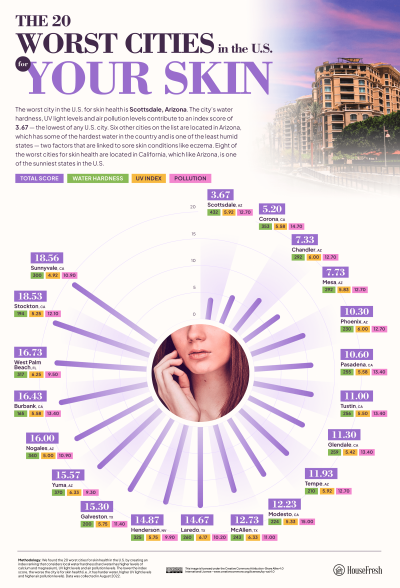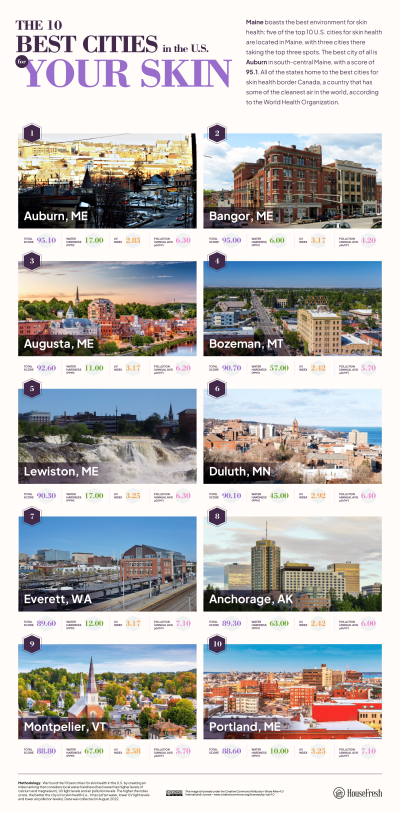From applying SPF to drinking enough water, we know the importance of taking care of our skin. But what if the health of your skin is being impacted by where you live?
A new study by experts in air purifiers, dehumidifiers and humidifiers at HouseFresh has revealed the best and worst cities for keeping skin healthy in the United States.
Giving 328 cities a score for skin health, researchers went from city to city measuring air pollution, hard water and ultraviolet light—all factors that can impact your skin.

"Skin health is something the U.S. takes very seriously, spending over $18 billion on skincare in 2021 alone—more than any other country in the world," James Booth, the managing editor of HouseFresh, told Newsweek. "With environmental factors such as air pollution still affecting more than 40 percent of people living in the country, the HouseFresh team wanted to find out the effects this is having on your skin and what can be done to prevent further damage."
To create the index score, each metric (air pollution, UV light and water hardness) was given a weight of 33.33 to add up to 100 in total.
Cities were awarded higher scores for cleaner air, less UV radiation and softer water while others received lower scores for factors like high pollution levels and more UV radiation.
5 Worst U.S. Cities for Skin Health
1. Scottsdale, AZ
2. Corona, CA
3. Chandler, AZ
4. Mesa, AZ
5. Phoenix, AZ
The study revealed that the city of Scottsdale, Arizona is the worst city in the U.S. for skin health, while the best place for great skin is Auburn, Maine.
"Studies have shown that air pollution, hard water and UV levels have harmful effects on our skin. For example, too much exposure to UV light can cause skin cancer and other skin conditions like solar elastosis," said Booth.
"Air pollution can cause a variety of health problems when inhaled but it can also cause skin to age prematurely. Meanwhile, bathing in hard water can worsen problems such as eczema and psoriasis."
Dr. Usman Qureshi, a leading cosmetic physician, skin expert, aesthetic doctor and founder of the Luxe Skin Clinic in Glasgow, Scotland told Newsweek that "UV light can cause extensive damage to the DNA in our skin cells, leading to skin cancer. UV light can also cause accelerated aging and hyperpigmentation."
Similarly, air pollution can have a real impact on skin health. Water hardness can impact skin, as well, leading to issues like eczema, blocked pores and even acne.
5 Best U.S. Cities for Skin Health
1. Auburn, ME
2. Bangor, ME
3. Augusta, ME
4. Bozeman, MT
5. Lewiston, ME
"We often forget about air pollution and how the environment can affect our skin health. Wherever we are, heavy metals, gasses and more are seeping into our skin without us realizing," said Qureshi.
"Hard water is very bad for your skin, especially if you have a pre-existing skin condition or sensitive skin. Hard water includes both magnesium and calcium, which together can form free radicals," he said. "Free radicals have been proven to break down the collagen needed to keep your skin looking healthy and can lead to fine lines and wrinkles."
Following Scottsdale, the worst cities in the U.S. for skin health include Corona, California, and the Arizona cities of Chandler, Mesa, and Phoenix, with high pollution, water hardness and UV index levels.



If you're thinking of a move with your skin in mind though, you might want to opt for somewhere in the state of Maine where three of the top 10 U.S. cities for skin health are located. Also scoring well for skin health are Montpelier, Vermont and Duluth, Minnesota.
"Considering the effects that these environmental factors can have on our skin, it's only reasonable for people living in the worst cities to worry about their skin health. That said, people can take steps to reduce environmental damage to their skin," said Booth.
Those steps include always wearing a broad-spectrum sunscreen with an SPF of 30 or higher, applying a moisturizer immediately after baths to lock in moisture and washing your face with high-quality cleanser at the end of the day to remove any pollutants that may have attached to your skin.
For general skin health, Qureshi also shared his recommendations: "Look out for skincare ingredients like pomegranates, Vitamin E and green tea, as they give your skin a glowing complexion.
"I would also recommend eating a varied and balanced diet, including antioxidant-rich fruit and vegetables, exfoliating three times a week and building a fool-proof skincare routine. My lifestyle tips include getting enough sleep, no tanning beds and bathing in warm water—rather than piping hot," he added.
Uncommon Knowledge
Newsweek is committed to challenging conventional wisdom and finding connections in the search for common ground.
Newsweek is committed to challenging conventional wisdom and finding connections in the search for common ground.
About the writer
Alice Gibbs is a Newsweek Senior Internet Trends & Culture Reporter based in the U.K. For the last two years ... Read more
To read how Newsweek uses AI as a newsroom tool, Click here.








